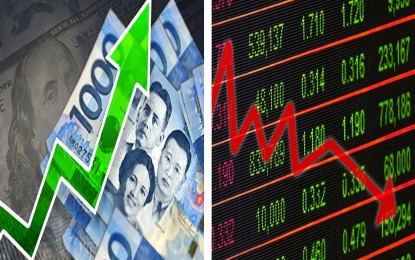
STAGFLATION CONCERNS. The local stock barometer declines on Tuesday (May 10, 2022) in line with its counterparts in Asia on investors' stagflation concerns. However, the peso improved against the greenback despite the strengthening of the US dollar. (PNA file photo)
MANILA – The local bourse’s main index started the shortened workweek on Tuesday in the negative territory, similar to its counterparts in the region, on fears about stagflation but the peso gained against the US dollar.
The Philippine Stock Exchange index (PSEi) shed 0.58 percent, or 38.97 points, to 6,720.93 points.
All Shares followed with a drop of 1.02 percent, or 37.08 points, to 3,584.62 points.
Most of the sectoral indices also declined during the day, namely Mining and Oil, 7.67 percent; Property, 2.33 percent; Services, 2 percent; Industrial, 0.41 percent; and Financials, 0.02 percent.
Only the Holding Firms index gained during the day after it rose by 0.43 percent.
Volume reached 3.2 billion shares amounting to PHP23.2 billion.
Decliners surpassed advancers at 169 to 52, while 34 shares were unchanged.
“Philippine shares slid, although at a smaller drop compared to the rest of the region as investors became concerned about the possibility of stagflation, with the main focus this week, the CPI (consumer price index) report on Wednesday)” said Luis Limlingan, Regina Capital Development Corporation (RCDC) head of sales.
Among the countries that will release inflation reports this week are the US and China.
For one, US CPI registered its four-decade high of 7.5 percent last January, and further rose to 7.9 percent and 8.5 percent in the succeeding two months.
Stagflation happens when inflation accelerates due to a recession and is accompanied by slower economic growth and steadily high unemployment figures.
This concern affected Asian stocks, which followed Wall Street, as investors’ concern about economic growth continued due to the accelerating inflation rate in major economies.
Among those that slipped during the day include the Nikkei 225 in Tokyo and Hong Kong’s Hang Seng, both of which were also affected by expectations of further tightening in the Federal Reserve’s key rates following the 25 basis points increase last March and the 50 basis points hike last week.
Meanwhile, there was no trading on the local bourse on Monday due to the local and national polls, results of which “will be the center of attention this week,” Limlingan said, noting that the unofficial vote count was among the factors for the day’s equities trading.
“For me, I think the fact that the election was peaceful and orderly, you could see there was bargain hunting towards (the) close. Compared to other regions, we performed much better,” he said.
For the rest of the week, factors that are seen to contribute to investors’ sentiments include the release of the first-quarter gross domestic product (GDP) report for the Philippines on Thursday and the speeches of several Federal Reserve officials, he added.
Meanwhile, the local currency gained against the US dollar despite the general strengthening of the greenback.
The local currency finished the day at 52.37 from 52.5 last Friday.
It opened the day at 52.499 from the previous session’s 52.48.
It traded between 52.499 and 52.34, resulting in an average of 52.402.
Volume totaled USD691.6 million, lower compared to the USD878.5 million at the end of last week. (PNA)
